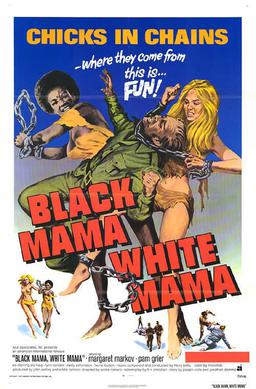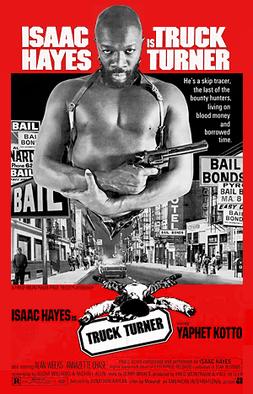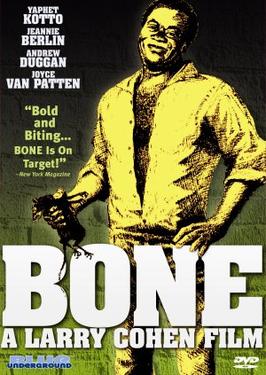
Benjamin Sherman “Scatman” Crothers was an American actor and musician. He is known for playing Louie the Garbage Man on the TV show Chico and the Man, and Dick Hallorann in Stanley Kubrick's The Shining (1980). He was also a prolific voice-over actor who provided the voices of Meadowlark Lemon in the Harlem Globetrotters animated TV series, Jazz the Autobot in The Transformers and The Transformers: The Movie (1986), the title character in Hong Kong Phooey, and Scat Cat in the animated film The Aristocats (1970).

Pamela Suzette Grier is an American actress and singer. Described by Quentin Tarantino as cinema's first female action star, she achieved fame for her starring roles in a string of 1970s action, blaxploitation and women in prison films for American International Pictures and New World Pictures. Her accolades include nominations for an Emmy Award, a Golden Globe Award, a Screen Actors Guild Award, a Satellite Award and a Saturn Award.

Black Belt Jones is a 1974 American blaxploitation martial arts film directed by Robert Clouse and starring Jim Kelly and Gloria Hendry. The film is a spiritual successor to Clouse's prior film Enter the Dragon, in which Kelly had a supporting role. Here, Kelly features in his first starring role as the eponymous character; is a local hero who fights the Mafia and a local drug dealer threatening his friend's dojo.

Coffy is a 1973 American blaxploitation film written and directed by Jack Hill. The story is about a black female vigilante played by Pam Grier who seeks violent revenge against a heroin dealer responsible for her sister's addiction.

Drum is a 1976 American film based on the 1962 Kyle Onstott novel of the same name. It was released by United Artists and is a sequel to the film Mandingo, released in 1975. The film stars Warren Oates, Pam Grier and Ken Norton, and was directed by Steve Carver.

Thalmus Rasulala was an American actor with a long career in theater, television, and films. Noted for starring roles in blaxploitation films, he was also an original cast member of ABC's soap opera One Life to Live from its premiere in 1968 until he left the show in 1970.

Black Mama White Mama, also known as Women in Chains, Hot, Hard and Mean and Chained Women, is a 1973 women in prison film directed by Eddie Romero and starring Pam Grier and Margaret Markov. The film has elements of blaxploitation.

Truck Turner, also known as Black Bullet, is a 1974 blaxploitation film, starring Isaac Hayes and Yaphet Kotto, and directed by Jonathan Kaplan. The screenplay was written by Michael Allin, Leigh Chapman, and Oscar Williams. Hayes also scored the music for the soundtrack. The film was released by American International Pictures as a double feature with Foxy Brown.

Bone is a 1972 American black comedy crime film written, produced, and directed by Larry Cohen in his directorial debut. It stars Yaphet Kotto, Joyce Van Patten, and Andrew Duggan. The film tells the story of a home invasion perpetrated by Kotto's character, who soon realizes that his victims are less wealthy and far unhappier than they initially appeared.

Blaxploitation is an ethnic subgenre of the exploitation film that emerged in the United States during the early 1970s. After the demand of the Black panthers for black artists to reclaim the power and rights to their image from the UCLA and the new rating system within Hollywood allowed up and coming black film makers and actors to create black films for black audiences. The term, a portmanteau of the words "black" and "exploitation", was coined in August 1972 by Junius Griffin, the president of the Beverly Hills–Hollywood NAACP branch. He claimed the genre was "proliferating offenses" to the black community in its perpetuation of stereotypes often involved in crime. After the race films of the 1940s and 1960s, the genre emerged as one of the first in which black characters and communities were protagonists, rather than sidekicks, supportive characters, or victims of brutality. The genre's inception coincides with the rethinking of race relations in the 1970s.

Eartha Moore, mononymously known as Eartha, is an American female eclectic and alternative soul singer, songwriter, and musician.
My Past Is My Own is a television film which aired as a CBS Schoolbreak Special on January 24, 1989. The film is centered on a sit-in in the early 1960s at a racially segregated lunch counter in the Southern United States. Whoopi Goldberg, Phill Lewis and Allison Dean portray the lead characters.

Badge of the Assassin is a 1985 television film starring James Woods, Yaphet Kotto and Alex Rocco. It was directed by Mel Damski. The film first aired on the Columbia Broadcasting System network on November 2, 1985. The film's production company was Blatt-Singer Productions.
Orville H. Hampton was an American screenwriter who worked mostly in low-budget films, particularly for producers Robert E. Kent and Edward Small. A screenplay that he and Raphael Hayes wrote for One Potato, Two Potato (1964) was nominated for an Academy Award for Best Original Screenplay.

Bucktown, USA is a 1975 American crime action blaxploitation film released by American International Pictures starring Fred Williamson.
Arthur Ronald Marks was an American film and television director, writer, producer and distributor best known for his work in the blaxploitation genre, directing films such as Bonnie's Kids, Detroit 9000, Friday Foster, Bucktown, The Monkey Hu$tle and J. D.'s Revenge. He also directed and produced numerous episodes of the American legal drama Perry Mason, as well as episodes of Starsky & Hutch, Mannix, I Spy, My Friend Tony, The Dukes of Hazzard, Steve Canyon, and Young Daniel Boone.

Cool Breeze is a 1972 American blaxploitation heist film directed and co-written by Barry Pollack and starring Thalmus Rasulala. It was released by Metro-Goldwyn-Mayer. The film is loosely based on W. R. Burnett's 1949 novel The Asphalt Jungle. It is the fourth film adaptation of the novel, after The Asphalt Jungle (1950), The Badlanders (1958) and Cairo (1963). The film was released with the tagline: "He hit the Man for $3 million. Right where it hurts. In the diamonds. And baby, that's cold."

Rosalind Miles was an American film and television actress and fashion model. Miles was most known for her roles in film during the early to late 1970s. Miles appeared in mostly American blaxploitation films such as; Shaft's Big Score!, The Black Six and Friday Foster.
Othello is Liz White's 1980 dramatic adaptation of William Shakespeare's Othello. An all black cast and crew, including actor Yaphet Kotto, created the film.















